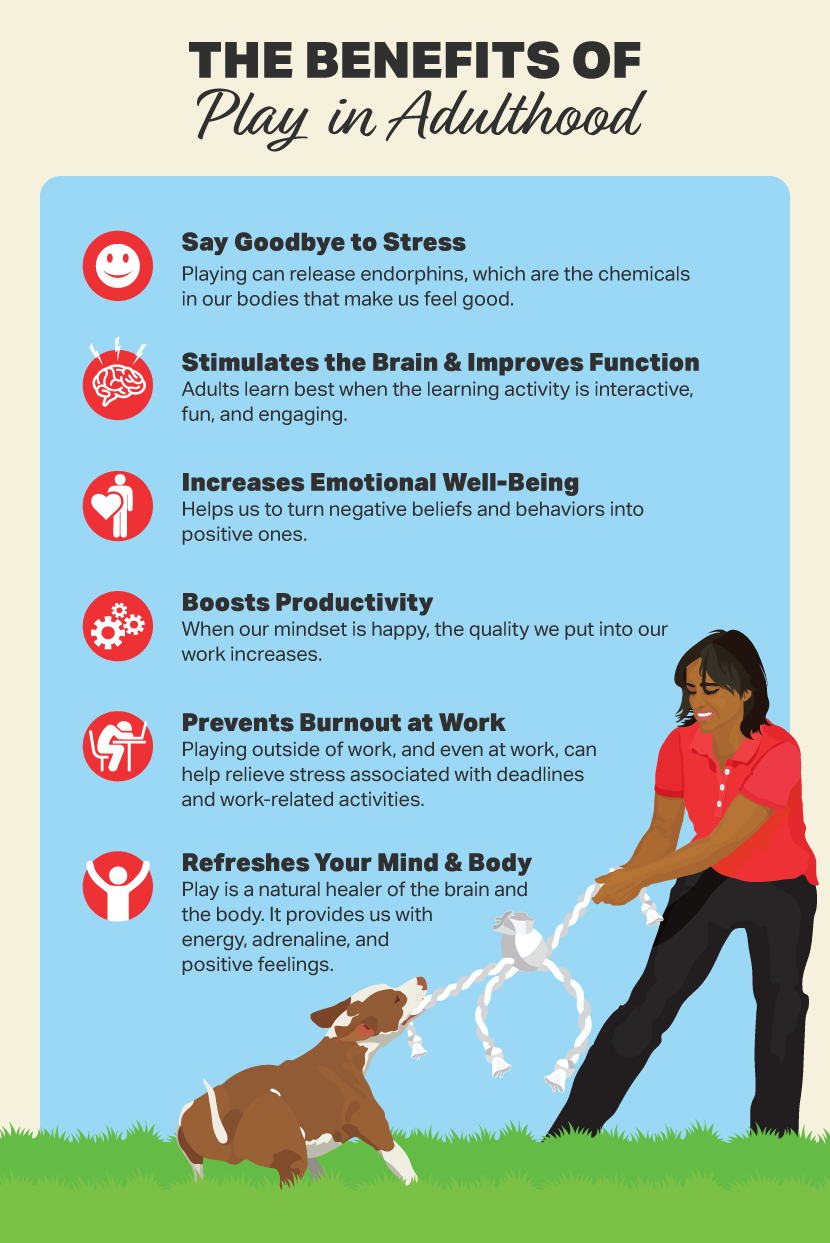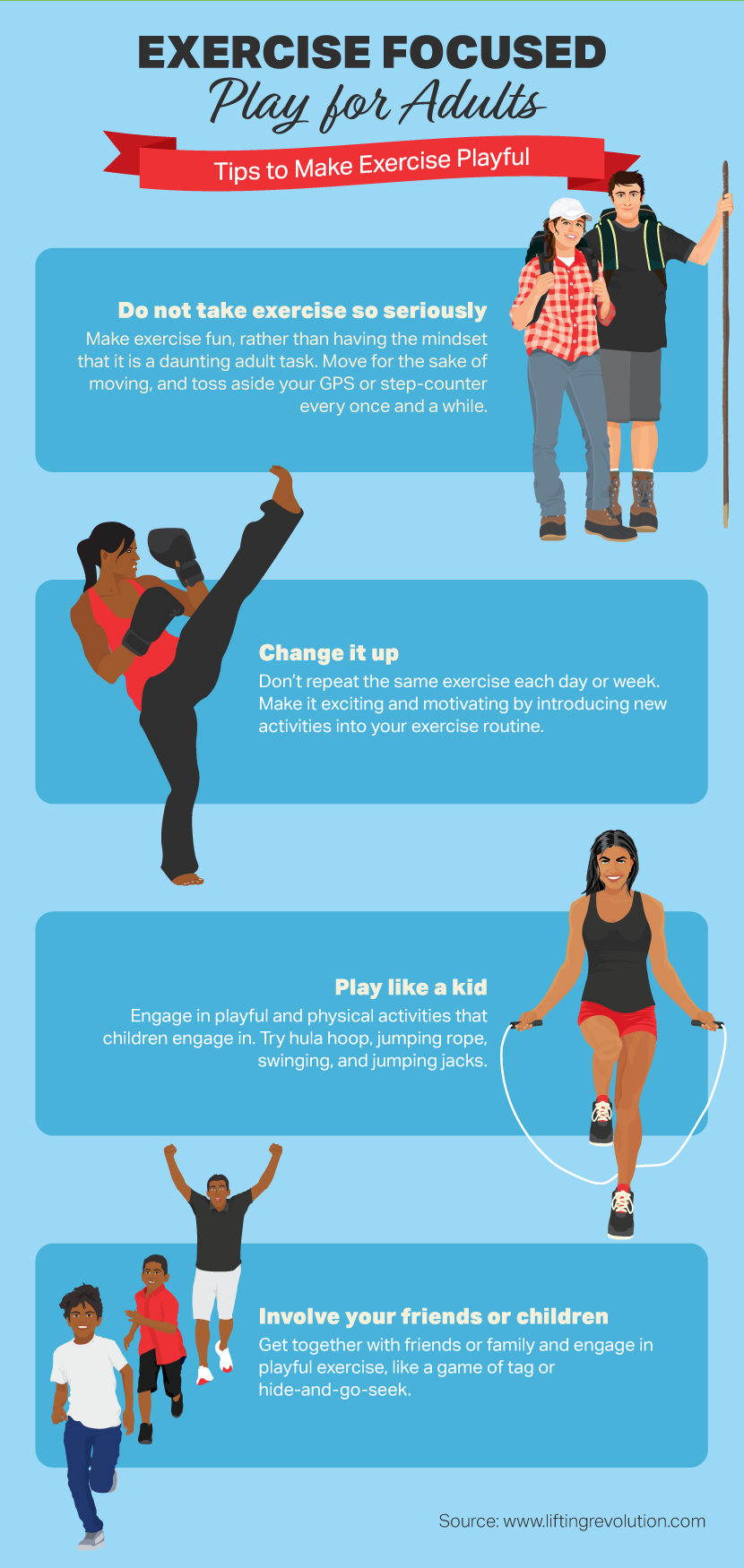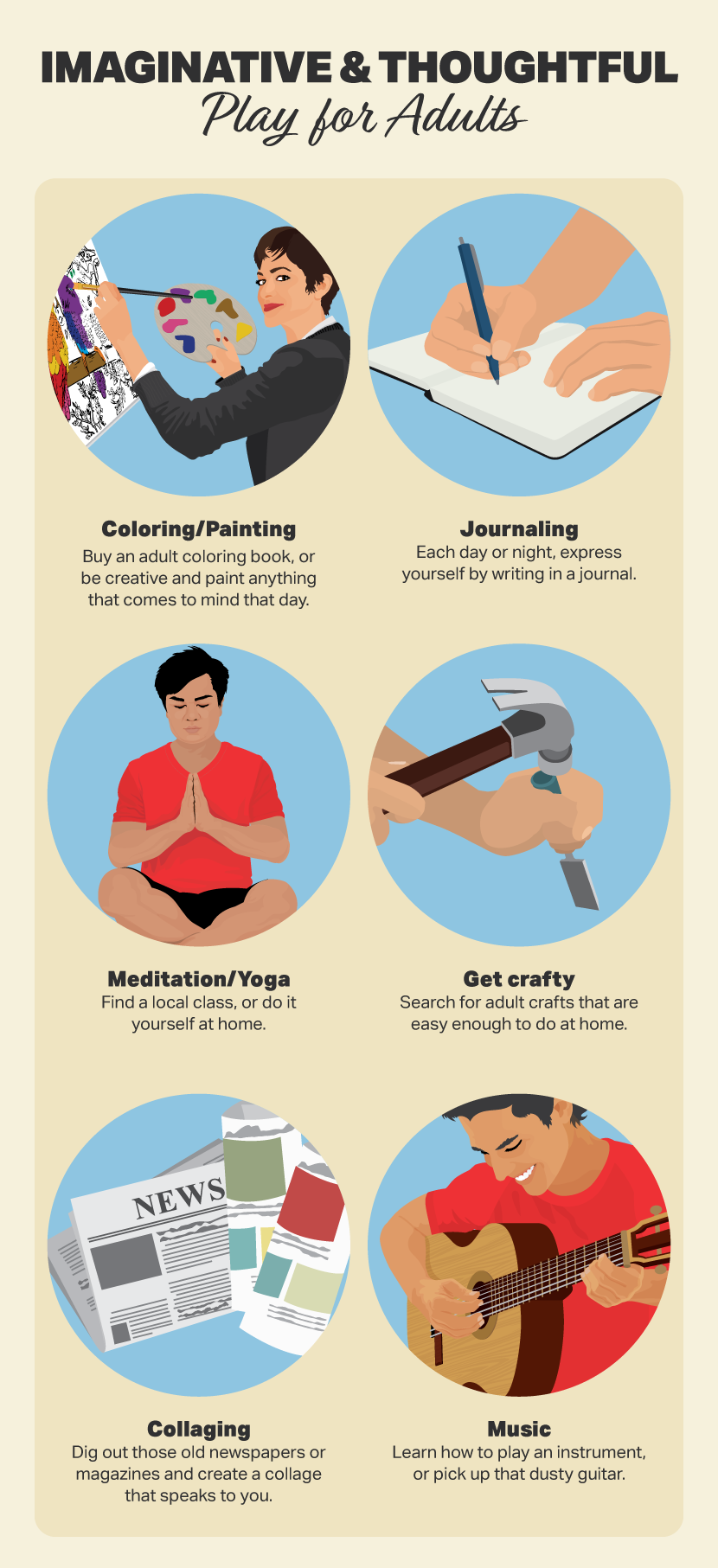Staying Young at Heart: Why Adults Should be Playing More
When we think of the word “play”, we think of children and their innate ability to engage in playful activities, the benefits
it has on their health, and how much fun children have while playing. Unfortunately for us adults, play is often dismissed in
everyday life and is viewed as immature, unproductive, and unwelcome. At some point, during our aging, we just stopped playing.
In our busy, modern, and technology filled world we have been focusing too much on work, family, and structured routines and we
have forgotten how to play. There needs to be a shift from thinking that play is an aspect of childhood, to the realization
that play is an important part of adult life. This article will discuss the benefits of playing in adulthood, and will provide
you with ways you can bring back play, novelty, and fun into your everyday life.
Why Play, Anyway? How Does It Help My Me?
We see a lot of news and research on the benefits of play on children’s development, health, and wellbeing. These benefits
do not stop at a certain age. In fact, play is beneficial for people of all ages. Play can positively influence your physical
and mental health, your relationships, and your productivity at work. Here are some of the many benefits to playing as an adult:
Say Goodbye to Stress. Playing can release endorphins, which are the body’s natural “happy” chemicals that make us feel
good. Endorphins are chemicals that can relieve pain, boost wellbeing, and promote happiness. When endorphins are released,
it also relieves stress in the body.
Stimulates the Brain and Improves Function. Adults learn best when the learning activity is interactive, fun, and engaging,
just like children learn. When challenges are playful, adults are more likely to remember what they learned and be more willing
to engage in similar activities again.
Improves Imagination and Creativity. When we are engaged in playful activities, we stimulate our creative minds, and
increase our imagination which helps us create new things, learn new skills, and problem solve.
Increases Emotional Well-Being. Exposing yourself to play, nature, and fun can support your emotional health by replacing
negative beliefs and behaviors and making them positive ones. Play can also act as a great distraction and means of increasing
happiness.
Improves Connections with Others. When adults play alongside others, it often involves laughter and having fun and this can
increase empathy, understanding, and compassion for others. When we play with others it is easier for us to break the ice and
develop friendships.
Improves Social Skills. If you are someone who thinks they could use a boost of increased social skills, then playing is
a great way to achieve this. Group activities involve teamwork, cooperation, perspective taking, communication, and
boundary-setting. Continued group play activities can support you in building and maintaining relationships.
Boosts Productivity. We are the most productive at work when our mindset is content and not overwhelmed. When our mindset
is happy, the quality we put into our work increases. Play can help you to achieve an energetic and happy mindset and
support you in getting things done at work.
Prevents Burnout at Work. If we can remain happy day-to-day, we are less likely to have burnout at work. Playing outside
of work, and even at work, can help relieve stress associated with deadlines and work-related activities that may cause
stress.
Refreshes Your Mind and Body. Play is a natural healer of the brain and the body. It provides us with energy, adrenaline,
and positive feelings that directly benefit our mental and physical health.
Boosts Innovation. Just as play boosts productivity, it also helps us to think about creative solutions to problems.
This creativity can be transferred to the work environment when we think about new ways of doing things, developing new
ideas, and creations.

Using Exercise as a Form of Play
A large part of play for adults, is exercise. However, many of today’s adults are experiencing a lack of exercise and
this is influencing obesity, diabetes, poor lifestyle choices, and mental health concerns. The term “exercise” has a
negative tone to it. When some of us think of exercise, we think of it as work, or just another thing to add into our busy
calendar. What if we altered our perception of the term “exercise” to include more enjoyment, fun, and play? Let’s think of
exercise as play and get excited to move, run, and sweat.
Here are some tips to get you thinking of exercise as play:
- Find ways of exercising that don’t feel like exercising. Do not make exercise a chore, but instead, think
of physical activities that are fun and motivating to you. Exercise can be whatever you want it to be.
- Do not take exercise so seriously. Make exercise fun, rather than having the mindset that it is a daunting
adult task. Move for the sake of moving, and toss aside your GPS or step-counter every once and a while.
- Change it up. Don’t repeat the same exercise each day or week. Make it exciting and motivating by introducing
new activities into your weekly exercise routine.
- Play like a kid. Engage in playful and physical activities that children engage in. Hoola hoop, jump rope,
swinging, jumping jacks, are all example of child-based activities that are still bound to get your heart pumping
and get you moving. Exercising does not have to involve only adult-based activities.
- Involve your friends or children. Get together with friends or family and engage in playful exercise.
Involving other people keeps us smiling, laughing, and more motivated.
Don’t know where to start with beginning to exercise playfully? Here are some ideas that you can try this week:
- Hiking or walking. You can make this exciting by choosing new trails each week and mapping where you have
gone, and where you would like to try next.
- Rock Climbing. If you are looking for an arm workout that does not involve lifting weights at the gym,
look for a local rock center near you.
- Dancing. There are lots of gym classes now that involve dance and music such as Zumba. You can take a dance
class, or you can go to the club with friends. Dancing is a fun and active way to sweat.
- Playing with your kids. You can play capture the flag, jump on the trampoline, go swimming, or create
an obstacle course in your backyard.
- Martial arts. Look for martial arts classes in your area, there are many different classes that might
interest you.
- Yoga. Yoga is a great way to tone and strengthen your body. You can practice yoga in a structured class, or
by yourself in your own home. There are online videos and apps that you can access for how-to videos.
- Joining a recreational sports league. Many areas have sports teams for adults in the summer months. Join a
softball or frisbee team with friends, or sign up by yourself and meet some new people.
We know that exercise has many benefits to our mental and physical health such as weight loss, decreased risk of
health issues, increased happiness and increased confidence (just to name a few). If we switch our mindset from exercise
to play, we can gain the many benefits that exercise has for us in our adulthood.

Adult Play That is Creative and Mindful
Don’t push aside your inner child. Rather, encourage your inner child to come out by engaging in play that is creative
and involves self-expression. The goal of this type of play is for you to recognize the creative potential that you have
within yourself, and to express that through creative mediums. When we engage in creative activities we can support our
self-esteem, our self-awareness and cope with emotions and stress. Creativity also promotes boosts in energy and
well-being.
Here are some ways that you can introduce more creative play into your life:
- Coloring/Painting. Buy or print some adult coloring pages or go to your local dollar store and purchase some
canvas that you can paint on. There does not have to be a specific way of painting. The key here is to be
creative and paint or draw whatever you want.
- Journaling. Each day or night, express yourself by writing in a journal. You can write about your day, about
what’s happening that week, exciting things coming in the years ahead, or goals you have for yourself.
- Meditation/Yoga. These activities not only involve physical play as mentioned above, but they are important when discussing creativity and mindfulness as well. Engaging in meditation or yoga supports us in our self-awareness, becoming mindful, and decreasing stress.
- Get crafty. Search for adult crafts that are easy enough to do at home. Your local dollar store will have
lots of craft supplies to work with. The possibilities here are endless.
- Create a vision board. A vision board is a way to get all your goals and visions on paper. Think about what
goals you have for yourself, and create an inviting and colorful board that supports you in reaching those goals.
- Collaging. Dig out those old newspapers or magazines and create a collage that speaks to you.
- Music. Learn how to play an instrument, or pick up that dusty guitar. You may even want to check out local bands playing in your area.

As adults, we are exposed to a lot of stress at work and home. We try and escape the chaos of our worlds by finding
things that make us happy. Sometimes, this is not an easy task. Let’s start by not pushing play aside and thinking of it
as only a childhood activity. When we understand the importance of play in adulthood, and how easy and fun it can be,
you can gain the many benefits that play has in all stages of adulthood.
Embed the article on your site

